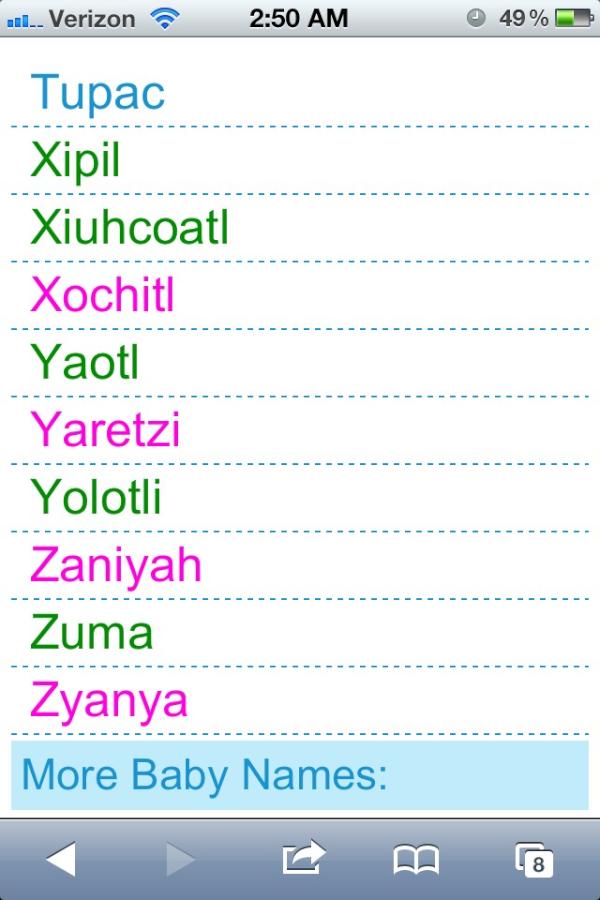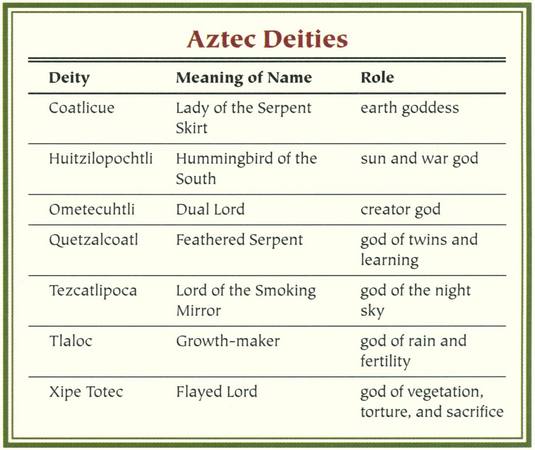
Aztec Names
Aztec names are just the right choice for a couple who want their baby boy to have a name, that is different from anyone else's. AptParenting lists out a variety of Aztec names with their meanings, so you pick the most suitable one for your little one. Like most mythologies, the Aztec pantheon was also “topped” with a primordial god. Known as Ometecuhtli, this primeval divine being of fertility was perceived as a dual entity representing both men and women, and as such, the name in Nahuatl belongs to “Two Lord” or “Lord of Duality” (also known as Omecihuatl or “Two Lady” ‘).
Baby names of Aztec Origin – Baby names of Nahuatl OriginAztec Origin names are the names given in the Nahuatl language, used by the Aztecs. These names also known as Nahuatl names are still used as boy names and girl names by the Nahua peoples of today. Nahuatl is a language group of Uto-Aztecan language family used in Central Mexico widely before the Spanish conquest of Mexico and is still spoken by about 1.5 million Nahua people in Central Mexico, El Salvador and among other regions across the coastline. Aztec Names meaningsThe meaning of the Aztec female names is mostly about the birth order but there is a greater variety of Nahuatl names for Aztec male names. The Aztec people were ethnic groups of Central Mexico, speaking the Nahuatl language and dominated large parts of Mesoamerica from the 14th to 16th centuries and especially the valley of Mexico which was the heart of Aztec civilization. See also for more information about the Aztec Names.Aztec Names (or Nahuatl names) have a great history, coming from a great civilization and culture and are an inspirational choice of names for your baby boy or baby girl.See Below our list of Baby names of Aztec Origin for boys and girls. Affiliate Links - Advertising DisclosureIf you purchase a product or service linked from this site, we may receive an 'affiliate commission'.
We are disclosing this in accordance with the Federal Trade Commission's 16 CFR, Part 255: 'Guides Concerning the Use of Endorsements and Testimonials in Advertising' and also in accordance to amazon associates programme operating agreement. AmazonThe owner of this website is a participant in the Amazon Services LLC Associates Program, an affiliate advertising program designed to provide a means for sites to earn advertising fees by advertising and linking to amazon.com.Amazon and the Amazon logo are trademarks of Amazon.com, Inc. Or its affiliates.
Kawasaki racing. This is a list of deities from the Aztec culture, its religion and mythology. Many of these deities are sourced from the Florentine Codex and another Codex and informants.
- Ahuiateteo, gods of excess and pleasure
- Macuilcozcacuauhtli, the god of gluttony
- Macuilcuetzpalin, one of the gods of excess and pleasure
- Macuilmalinalli, one of the gods of excess and pleasure
- Macuiltochtli, the god of drunkenness
- Macuilxochitl, the god of gambling and music, and an aspect of Xochipilli
- Centzonmimixcoa, 400 gods of the northern stars.
- Centzonhuitznahua, 400 gods of the southern stars.
- Coyolxauhqui, goddess and leader of the Centzonhuitznahua, associated with the moon
- Mayahuel, goddess of Agave. (Mother of the Centzontotochtin)
- Huitzilopochtli, god of sun and war
- Patecatl, god of healing, patron god of doctors, peyote (Father of the Centzontotochtin)
- Ixtlilton, god of medicine and healing,
- Centzontotochtin, 400 gods of pulque
- Ometochtli, god of pulque, leader of the Centzontotochtin
- Tezcatzoncatl, god of pulque
- Tlilhua, god of pulque
- Toltecatl, god of pulque
- Tepoztecatl, god of pulque
- Texcatzonatl, god of pulque
- Colhuatzincatl, god of pulque
- Macuiltochtli, god of pulque (drunkenness)
- Cinteteo, gods of the maizes associated with the Tianquiztli
- Iztacuhca-Cinteotl, god of the white maize.
- Tlatlauhca-Cinteotl, god of the red maize.
- Cozauhca-Cinteotl, god of the yellow maize.
- Yayauhca-Cinteotl, god of the black maize.
- Cinteotl, god of maize.
- Cipactonal, god of astrology and calendars associated with daytime
- Oxomo, goddess of astrology and calendars associated with nighttime
- Cihuateteo, were the malevolent spirits of women who died in childbirth. They were likened to the spirits of male warriors who died in violent conflict, because childbirth was conceptually equivalent to battle in Aztec culture.
- Titzimitl, were female deities, and as such related to fertility, they were associated with the Cihuateteo and other female deities such as Tlaltecuhtli, Coatlicue, Citlalicue and Cihuacoatl. The leader of the tzitzimimeh was the Goddess Itzpapalotl who was the ruler of Tamoanchan - the paradise where the Tzitzimimeh lived.
- Cihuacoatl, goddess of childbirth and picker of souls.
- Coatlicue, goddess of fertility, life, death and rebirth
- Chimalma, goddess of fertility, life, death and rebirth
- Xochitlicue, goddess of fertility, life, death and rebirth
- Itzpapalotl, death goddess, obsidian butterfly, leader of the Tzitzimitl
- Toci, goddess of healing
- Temazcalteci, goddess of maternity associated with Toci.
- Quilazli, Patron of midwives. Also known as Coaciuatl (Cihuacoatl), serpent woman, Quauhciuatl, eagle woman, Yoaciuatl, warrior woman, and Tzitziminciuatl, devil woman. (Individual honorary classes for women)
- Chantico, goddess of fires in the family hearth and volcanoes
- Huehuecoyotl, god of old-age and origin patron of wisdom followed by tricks, foolings
- Huehueteotl, god of old-age and origin
- Xiuhtecuthli-Heuheuteotl, the connection of old-age and time
- Xiuhtecuhtli, god of fire and time
- Xiuhtotontli, gods of fire (alternative manifestations or states of Xiuhtecuhtli).
- Xiuhiztacuhqui, god of the white fire.
- Xiuhtlatlauhqui, god of the red fire.
- Xiuhcozauhqui, god of the yellow fire.
- Xiuhxoxoauhqui, god of the blue fire.
- Mictlantecuhtli, god of the Underworld. (Mictlan)
- Mictecacihuatl, goddess of the Underworld. (Mictlan)
- Techlotl, god who lived in one of nine layers of the underworld (associated with owls)
- Nextepeua, god who lived in one of nine layers of the underworld
- Micapetlacalli goddess who lived in one of the layers of the underworld (wife of Nextepeua)
- Iixpuzteque, god who lived in one of nine layers of the underworld
- Nesoxochi, goddess who lived in one of the nine layers of the underworld (wife of Iixpuzteque)
- Tzontemoc, god who lived in one of nine layers of the underworld
- Chalmeccacihuatl, god who lived in one of the nine layers of the underworld (wife of Tzontemoc)
- Xolotl, god of death, associated with Venus as the Evening Star (Double of Quetzalcoatl)
- Ometeotl, gods of duality.
- Ometecuhtli, god of substance.
- Omecihuatl, goddess of substance.
- Tonacatecuhtli, god of sustenance associated with Ometecuthli
- Tonacacihuatl, goddess of sustenance associated with Omecihuatl
- Piltzintecuhtli, god of the visions, associated with Mercury (the planet that is visible just before sunrise or just after sunset) and healing
- Citlalicue, goddess of female stars (Milky Way).
- Citlalatonac, god of female stars (Milky Way)
- Mixcoatl, god of hunting, (old god of hurricanes and storms), associated with the milky way
- Amhimitl is Mixcoatl’s harpoon (or dart) just like Xiuhcoatl is Huitzilopochtli's weapon.
- Tonatiuh, god of sun.
- Nanauatzin, god who sacrificed himself in a fire so that the sun should continue to shine over the world. (Tonatiuh took his place.)
- Metztli, goddess of moon.
- Tecciztecatl, represents the male aspect of the moon. Tecciztecatl is the son of Tlaloc and Chalchihuitlicue.
- Tlahuizcalpantecuhtli, god of dawn (Venus) aspect of Quetzalcoatl
- Xolotl, god of death, associated with Venus as the Evening Star (Double of Quetzalcoatl)
- (They have both Venus as association as symbol of twins)
- Four Tezcatlipocas
- Tezcatlipoca, god of providence, the darkness and the invisible, lord of the night, ruler of the North. (Black Tezcatlipoca)
- Quetzalcoatl, god of the life, the light and wisdom, lord of the winds and the day, ruler of the West. (White Tezcatlipoca)
- Xipe-Totec, god of force, lord of the seasons and rebirth associated with vegetation, ruler of the East. (Red Tezcatlipoca)
- Huitzilopochtli, god of will and the war, patron of sun and fire, the lord of the South. (Blue Tezcatlipoca)
- Painal, messenger of Huitzilopochtli
- Tlacahuepan, (Toltec) god of war, brother of Huitzilopochtli
- Tepeyollotl, god of the animals, darkened caves, echoes and earthquakes. Tepeyollotl is a variant of Tezcatlipoca, associated with mountains
- Itzcaque, god who representation of Tezcatlipoca in his capacity of starting wars for his own amusement.
- Chalchiutotolin, god of cleanse of contamination, absolve human of guilt, and overcome their fate, variant of Tezcatlipoca
- Ixquitecatl, god of sorcerers
- Itztlacoliuhqui-Ixquimilli, god of frost, ice, cold, winter, sin, punishment and human misery. He is also the god of objectivity and blind-folded justice. He is a variant of Tezcatlipoca and associated with the night and the north.
- Macuiltotec, god of arsenal, Mainly associated with weaponry and the rites of warfare, maybe a form of Tezcatlipoca.
- Itztli, god of stone and sacrifice. He is a variant of Tezcatlipoca and shares qualities with Itztlacoliuhqui-Ixquimilli
- Atlatoman, patron goddess of those born with physical deformities or for those unfortunate Mexica who suffered from open sores. This deity was also thought to be the cause of these ailments.
- Amapan, deity of the tlachtli ballcourt, patron deities of Ullamaliztli (ball game)
- Uappatzin, deity of the tlachtli ballcourt, patron deities of Ullamaliztli (ball game)
- Itzpapalotltotec, god of sacrifice
- Itzpapalotlcihuatl, goddess of sacrifice.
- Ehecatl, god of wind.
- Tlaloc, god of rain and lightning and thunder. He is a fertility god
- Tlaloque, Tláloc was also considered the ruler of the Tlaloque - a motley group of rain, weather and mountain gods
- Chalchiuhtlicue, goddess of water, lakes, rivers, seas, streams, horizontal waters and baptism.
- Atlaua, god of water, protector of archers and fishermen (The Aztecs prayed to him when there were deaths in water)
- Opochtli, god of fishing and birdcatchers discoverer of harpoons and the net
- Huixtocihuatl, goddess of salt and patron of cultivated foods and people in the salt trade
- Atlacoya, goddess of drought.
- Tlaltecuhtli, old god of earth (changed in the landscape and atmosphere)
- Tlalcihuatl, old goddess of earth (changed in the landscape and atmosphere)
- Tlaltecayoa, associated with the round earth
- Coatlicue, goddess of Earth
- Tlazolteotl, goddess of lust, carnality, sexual misdeeds.
- Xipe Totec, god of force, patron of war, agriculture, vegetation, diseases, seasons, rebirth, hunting, trades and spring, the lord of the East.
- Chicomecoatl, goddess of agriculture
- Cinteotl, god of maize
- Xilonen, goddess of tender maize
- Chicomecoatl-Xilonen, goddess of tender maize, also sometimes referred to as Chicomecoatl as connection of maize and agriculture and they were both female deities.
- Ppilimtec, god of music and poetry
- Omacatl, god of feast and joy
- Xippilli, god of the verdant fields associated with summer.
- Xochipilli, god of love, art, games, beauty, dance, flowers, maize, fertility, and song.
- Xochiquetzal, goddess of fertility, beauty, female sexual power, protection of young mothers, pregnancy, childbirth, and women's crafts.
- Xochitlicue, goddess of growthiness, she is the mother of the twin gods Xochiquetzal and Xochipilli.
- Yacatecuhtli, patron god of commerce and travelers, especially business travelers
- Zacatzontli, god of roads 'sacbeob' (He can be a protector for merchants)
- Malinalxochitl, goddess or sorceress of snakes, scorpions and insects of the desert.
- Nappatecutli, patron god of mat-makers.
- Ilamatecuthli, goddess of weavers and patron goddess of weaver guilds

- Camaxtli, see Mixcoatl
- Inaquizcaotl, see Huitzilopochtli.